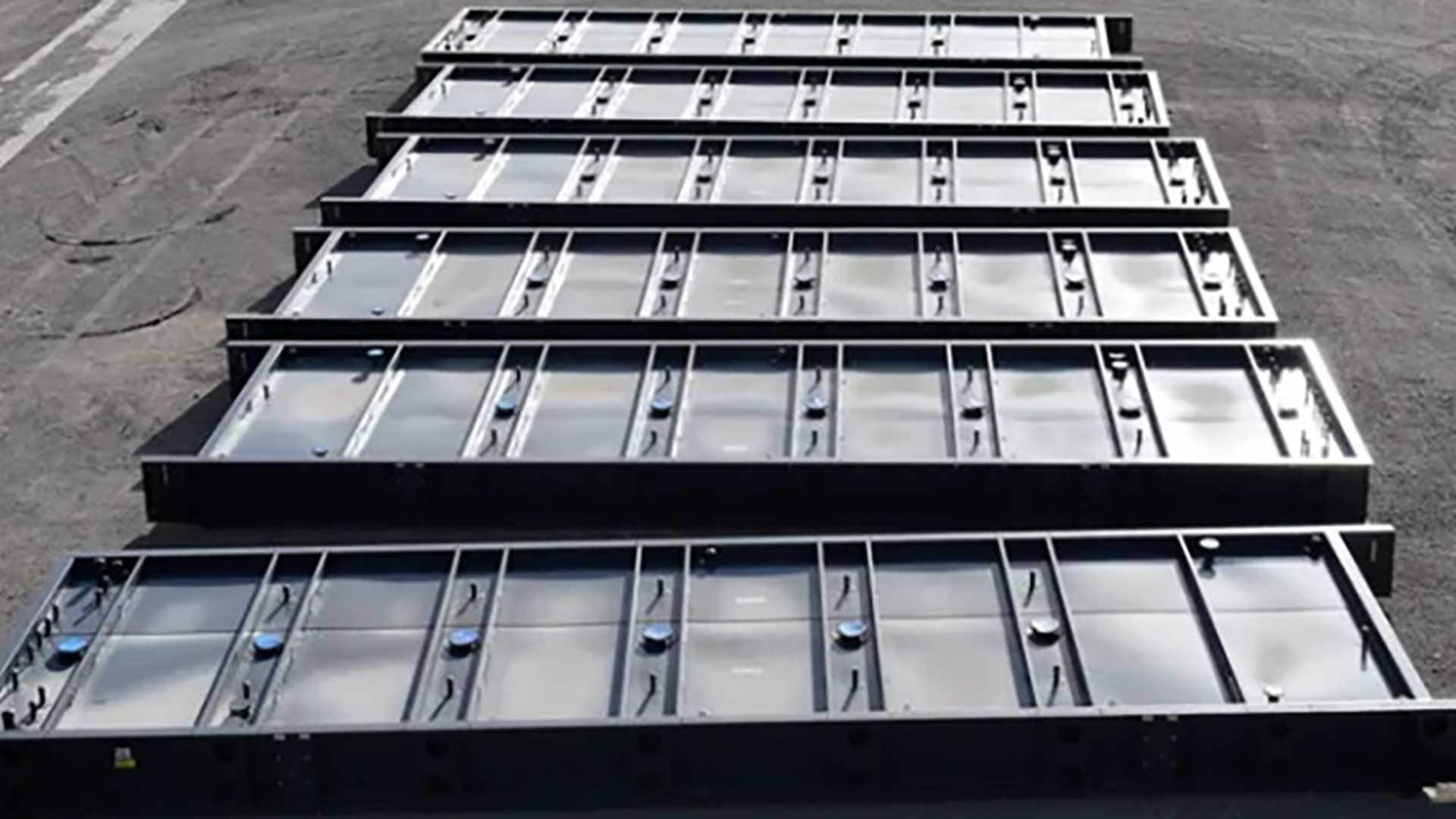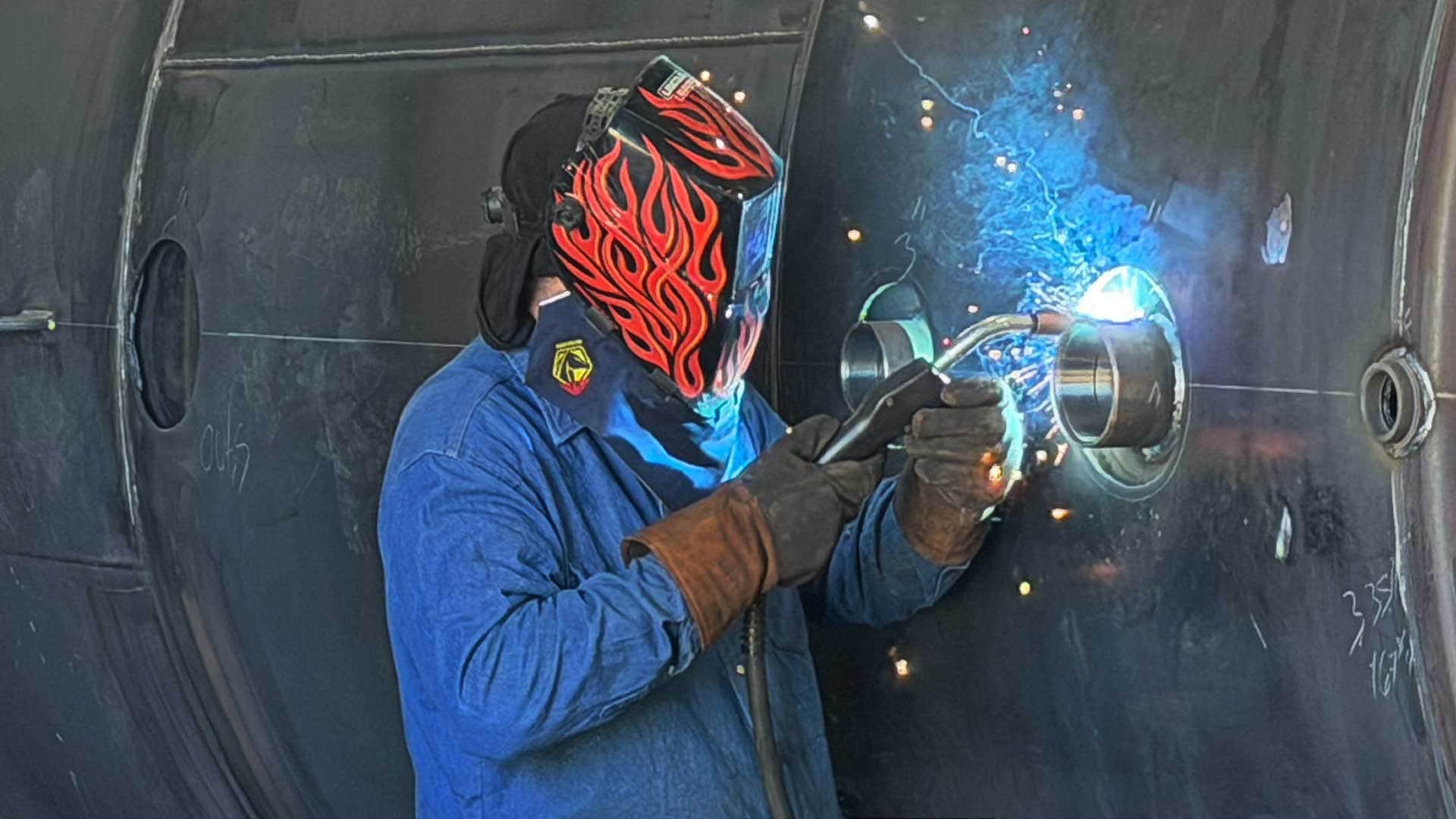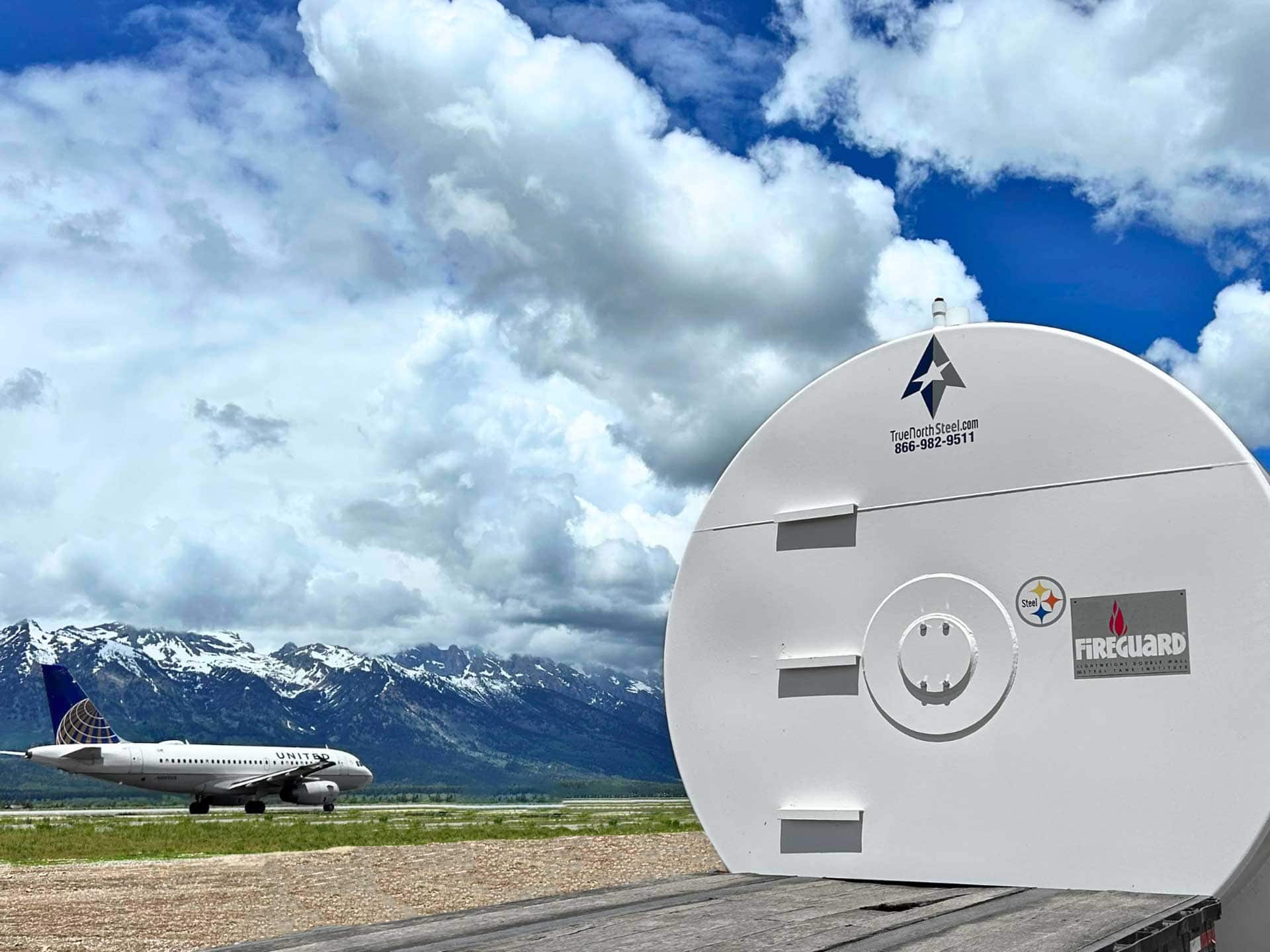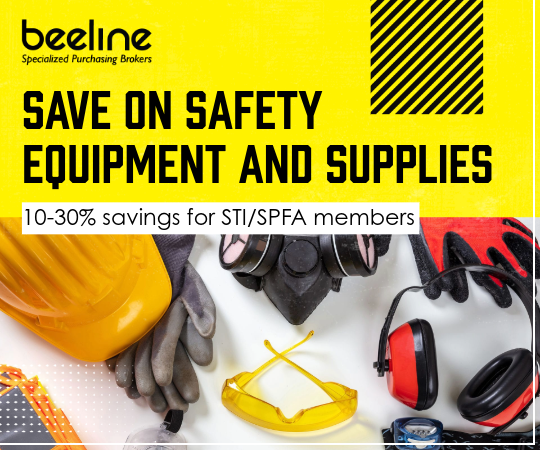With over 30 years at Samuel Pressure Vessel Group, Todd Anderla, Vice President of Operations, brings a wealth of experience, insight, and leadership wisdom.
Todd recently sat down with Aaron Marshall, Sales Manager at Samuel Metal Spinners, Samuel Pressure Vessel Group, and LZR FIT, to share his journey, leadership philosophy, and valuable advice for emerging leaders in the industry.

Aaron Marshall: I’m Aaron Marshall. I’m with Samuel Metal Spinners as well as Samuel Pressure Vessel Group LZR FIT.
I’m here with, Todd Anderla, who is the Vice President of Samuel’s technologies. He’s been with the company for over thirty years. I’m interviewing him as part of the STI/SPFA Emerging Leaders Industry Leader Spotlight.
So Todd, thanks for joining us. Can you tell us a little bit about your career with Samuel?
Todd Anderla: Sure. So, I’ve been with Samuel, as Aaron mentioned, for thirty years. Boy, I’ve been working since I’ve been twelve, starting off as a paper boy, but the last thirty years has been with Samuel.
I started here as an inventory analyst and so fundamentally, my career started in supply chain, supply chain management. I did that for approximately twenty years, and through that time, I was inventory analyst, I took care of cycle counting, I took care of finding product, I took care of improving our inventory management, became a purchasing manager for Marinette, Wisconsin, and then the opportunity came where I was purchasing manager for the group. At the time, it was Marinette, Wisconsin; Tomahawk, Wisconsin; and Abington, Virginia.
I did that for about twenty years, and then ten years or so ago, I had the opportunity to move into operations. And my first role in operations specific was operations manager for Marinette, Wisconsin. And I did that for, three, four, five years and then got the opportunity to go into the current role where I’m at, where I have responsibility for multiple sites.
Marshall: So, you’ve had a lot of opportunity to be a leader, throughout your career. Describe your leadership style and how you lead others.
Anderla: I like the term servant leader. That’s that sounds nice and it’s and it’s a word people use, but it makes a lot of sense to me.
As I’ve grown in my career, my real role as a leader is to help the folks around me be successful and make sure they have the tools, they have the knowledge, they have the training, to be successful, and that’s what I’d like to think I currently do is that I work with the team to help them be successful. And I’d like to think I do it in a collaborative means where we pull the folks together and we gather, and we work through the issues; be it goals and objectives for the year or be it how we get a tank out the door the next day.
Marshall: High energy I would also add for you. I’ve had the opportunity to work with you for about eight years, and you bring a lot of energy to the table, which is contagious. And so compliments you on that.
Anderla: Well, thank you.
Marshall: What makes a great leader, in your opinion?
Anderla: You know, you mentioned that high energy. I think you have to, as a leader, come to the table in a positive manner. And not everyone’s going to do it as I do it, but you have to come to that table with a positive attribute.
I also think, while I say collaborative, a leader needs to listen, and you learn that over time. When you’re 25 years old, come out of college, you know everything. Very quickly you learn you don’t know everything, and as you grow and if you are successful, I think a key to that success is listening to the folks around you, and working with those folks, listening to them, and using their expertise to be successful.
Marshall: Can you give some instances of how you have handled disruption in the industry, such as Covid, supply chain issues, inflation, etc.?
Anderla: Covid, that was that was an experiment for all of us. And I think with Covid, we approached it from a cautious standpoint where you got the best information you could get, and you went with that information, be it working from home or be it wearing a mask, be it separating.
Inflation, and as I’m saying these words out loud now, I think inflation and tariffs, it’s understanding the issue and understanding how the issue is going to impact the business. And then from that information and what’s going through my brain at this point is, you’re gathering information to try to make decisions. You’re gathering data to try to make decisions.
So be it Covid, be it tariffs, be it inflation, you’re trying to learn the information, gather the data to try to make a decision. And so how do you handle some of that stuff? Gathering information, gathering data, working with the team to try to make the best decision and then be willing to, all right, this is working or not working, and then make adjustments as needed.
Marshall: Certainly have seen some trying times, especially in the last five years or so.
Anderla: No question.
Marshall: How do you handle failure?
Anderla: How I’d like to handle it is one way and maybe how I handle it, it’s another way.
But how I handle failure is, first of all, you’ve got to identify it and just face it. And if something doesn’t go to plan or if something fails, you have to own it. I know that’s a bit cliché, but you do. You need to own it, you need to face it, you need to identify it, you need to analyze it, understand why it happened. And that includes working with the folks that are involved.
I think as a leader, in the end, you need to kind of own it. That doesn’t stop us from finding out why something happened, because you need to understand why it happened, so you can put into place policy, procedure, tools, training, so that it doesn’t happen again.
I guess that’s how I would approach failure.
Marshall: Looking back at your own personal experience, are there any situations that you wish you could go back and handle it differently?
Anderla: I like this question, and I can think of a number of them, but then as I thought about them, they all came down to my interactions with people where I did not react to a situation well, and generally it’s with people.
I can think back to early in my manufacturing career, one of the folks I worked with didn’t go down the path that that I had hoped he would go down, and I reacted within a group and, you mentioned I’m high energy, with maybe a little more energy than I needed to.
First of all, it shouldn’t have been in a group, and it shouldn’t have been high energy, and I needed to just slow down and understand the issue better. So, how I react and interact with people when I failed, those have been the ones that stick out most to me and I most regret.
Marshall: Being someone with as much tenure as you have in the industry, if you could go back in time, obviously you’re in a position now to be able to pass your message to younger generations, part of this Emerging Leaders Committee, what’s something that you wish someone told you during your career that you could pass on?
Anderla: Here’s another question, I enjoyed the question. I think I’ve been really lucky in my career with people who have taught me a ton. Some of them have taught me what not to do, and some of them have taught me what to do.
But one of the real issues or topics that I wish I would have been better at earlier is just managing my schedule and my time. Just manage to a schedule, manage your schedule. That doesn’t mean being inflexible, but it does manage your time better and put it on the calendar, put it in your schedule, plan for it.
I think that is one thing I wish I had been better at earlier in my career.
Marshall: What are some challenges and opportunities that you see coming up for future generations in this industry?
Anderla: Technology. I think technology is coming at us fast and furious
I think about going back to when I was a kid in a black and white TV to today. Phones can do anything you want and now we’re talking AI. I’m not a technology guy, but what AI is going to bring to the table, what robotics are bringing to the table. I think that’s a huge challenge to leverage that technology and that information for the business
I think that’s going to be a huge issue going forward.
Marshall: I would agree with that. Trying to stay on top of it.
Anderla: Yes.
Marshall: What advice would you pass along to the next generation?
Anderla: This one I believe in just raise your hand and say yes.
You talked about failure, you talked about the people I’ve worked with or what I’ve learned from the people, but just say yes. And I was not successful every time I said yes, but I did if I thought I could do it.
I’m not a welder, so I’m not going to go out and tell somebody I can weld a tank. There are limits to that, but I didn’t shy away from a task or a project or putting myself out on a ledge and trying to do something.
And so I would recommend to anyone with ambition, don’t be afraid to say yes, raise your hand, and take on a responsibility, even if it feels like a stretch responsibility.
Marshall: Any other closing thoughts that you have on this?
Anderla: Here may be another cliché, but find something you like to do. I think that’s important. And I’ll tell people I’m lucky. I like what I do. I like the people I work with, I think they’re amazing. I think the products we make are amazing.
I enjoy coming to work every day. And is every day easy? No, I’m not going to say it’s easy. But at the end of the day, I’ve enjoyed what I’ve done and I’m ready for the next day.
And so, find what you can do, find what you enjoy doing, and if you can make that happen, it’s all right.
Marshall: Well, thank you for your time. I appreciate you jumping on and doing this with me. And I certainly appreciate, you and I have worked together, hand in hand over the course of the last eight years, and I’ve appreciated all the insight and handling of things that you’ve done on my behalf and things I’ve learned from you, so certainly hope this helps some others coming up in the industry.
Anderla: The feeling is mutual, Aaron. I’ve enjoyed working with you. Your knowledge of the industry, what you bring to the table up to and including yesterday, as you and I discussed, burning holes in Tomahawk, for crying out loud.
We’re not done yet, are we, Aaron?
Marshall: Nope, never done. Well, thank you so much for your time, Todd.
Anderla: Thank you. I enjoyed it.






